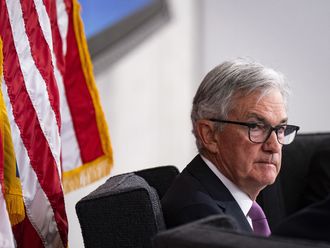
Hostile global forces wreaked havoc on economies around the world in 2009. It is understandable, therefore, that financially despondent citizens should not want to hear the word that became synonymous with last year — bailout.
Except that is, in Kuwait. Indeed, many of its nationals are hoping to hear the term that so many of us have become utterly tired of. As the Kuwaiti government and parliament come to a binding agreement on whether to rescue its citizens from a tide of mounting debt, the rest of the GCC watches on with interest to see what lessons can be learned.
It was Kuwait's national assembly that recently caused the furore by voting in favour of a bill that could see the government assume responsibility of Dh85.8 billion worth of consumer debt.
If the parliament has its way the government would pay for citizens' loans, while banks would have to wave goodbye to the interest on them. The debt would be rescheduled and the government would repay it over a maximum period of between 10 to 15 years.
The parliament has been accused of voting in populist pledges for their own short term political gain.
Although the ruling administration is against the plan, the bill enjoyed significant support with 35 votes in favour and 22 against. Under Kuwait's constitutional monarchy system both parliament and cabinet vote on legislation in their domestic national assembly. At the moment both sides are pitted against one another.
Placing oneself in the position of an indebted Kuwaiti it is understandable to see why the public would want the government to rescue them. Analysts and banking experts, however, sneer at talk of a bailout. Economists are worried that wiping out consumer debt will lead to a moral and social problem.
On the face of things, they are correct. If the bill is passed and the debt is expunged it will bring the reputation of Kuwait's banking system into disrepute. Nationals will be more likely to ignore contracts because they will think the government will always swoop to save them.
The truth is though that this is already the case in Kuwait. Previous government pledges which wiped public debt — most notably the Souk Al Manakh stock market crash in 1982 and the Iraqi occupation in 1991 — sowed the seeds of the current financial recklessness.
Nevertheless, the bailout culture in Kuwait must stop.
For other commodity based economies, such as the UAE, two basic but valuable lessons can be learned from the Kuwaiti situation. Firstly and perhaps most importantly, is banking vigilance. A factor that allowed Kuwait's consumer debt to spiral out of control was a decade long oil boom, which fuelled growth and excessive lending by financial institutions. At the moment banks in the UAE are relatively reticent regarding lending compared to boom years. But as we take tentative steps into 2010, many believe there is going to be a strong resurgence of economic growth, particularly in Abu Dhabi.
Banks here will do well to remember the tough times of 2009 and monitor consumer lending patterns when the economy is booming. In comparison to their Western counterparts domestic banks have been successful in vigilantly balancing consumer debt in order to fuel sales and empower responsible consumers. Everybody will benefit if they continue further along on this path.
Secondly, should the Kuwaiti government decide to wipe consumer debt, it may lead to citizens of other oil rich GCC countries to wonder why their policymakers can't follow suit.
It is for this reason that governments, banks and the whole financial system must do more to educate consumers of the benefits of financial prudence.
This is the only sure-fire tool for reducing excessive levels of consumer debt over the long term. For the sake of governments and citizens the world over let's hope this becomes the new phrase for the next 12 months, replacing 2009's watchword — bailout.
The writer is editorial manager of Oxford Business Group, Abu Dhabi.












